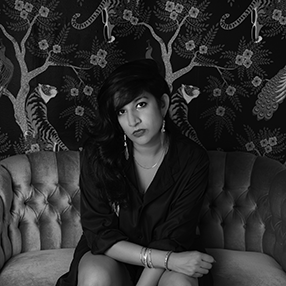The Jungle
In midsummer, in Los Angeles,
the night is fractured
with mountains, grilling ink
into the blue thaw. I trail
into pools and pastures,
and in the diner,
tattoos speck
and skirt up booths,
the waitress, Dottie, is whipping
shells, mac and cheese,
waffles and chickens,
all oracles in the oil.
You think I’m kidding? Look
at Hopper’s orange rooms,
his lone man. Vineyards
are boring to paint,
the coffee rumbling us all
into a primal scene, the mismatched
silverware like guns in a Western,
all the possibilities
of a warm night.
The thing about LA is
anyone can walk through
the door. The drunk drive, the
open-air and clipping down
Highland Avenue. Here are all the streets
I remember: Alvarado and Effie.
Mohawk and Montana. Before
all this? The hills of Carpinteria,
cattle punk, the drained floodplains
and eucharistic jimson weed.
But dig that ditch city,
those impersonal stones,
the great vigilance
of the 19th century,
the circus of eggs on the plate,
Dottie full of lips, just lips
sipping, stinging the sandy air.
Copyright © 2015 by Megan Fernandes. Originally published in Poem-a-Day on June 22, 2015, by the Academy of American Poets.
“‘The Jungle’ is about a brief time when I was living in Echo Park and exploring the different cinematic landscapes of Los Angeles. Being from the East Coast, I had a really visceral reaction to the space of that city, most significantly, the kind of kitsch imagery, the overwhelming highway infrastructure, a particular type of loneliness and anonymity. I was reading a lot of O’Hara while there, and I think there was something productive about reading about New York City while living in LA. O’Hara was always trying to make saints of celebrities, holy imagery of the everyday street scenes, mythologize instead of thwart the stereotypes of an urban space, and I was influenced in that way, thinking about the oracles of fried food, the primal scenes of a diner, the eucharistic weeds.
—Megan Fernandes

